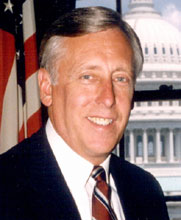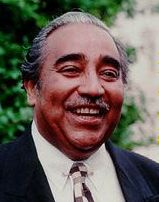If the Democrats win back the House, the likely leadership of the chamber, and the chairmen of all committees with jurisdiction over Colombia policy, will be made up of people with long records of criticizing the current U.S. policy toward Colombia. (Skip down to see who they are and what their records are.)
Most have expressed concerns about the lack of results against drugs, the Colombian armed forces' human-rights record, the open-ended U.S. mission, and the need for more development assistance. Most have consistently supported legislative efforts over the past six years to reduce the amount of military aid going to Colombia and to do more to address poverty and human-rights abuse.
While the overall amount of aid from a Democratic House would likely be larger, though, the ratio between military to economic aid would probably be significantly different from the current 80 percent to 20 percent split. U.S. aid would become less military in focus, with more funding for priorities like alternative development, civilian governance, judicial reform, aid to the displaced and human rights. Aid would be more strongly conditioned on the Colombian military's human-rights performance, and the aerial herbicide fumigation program, which has not reduced coca-growing, will come up for particular scrutiny. A Democratic chamber would also increase investment in drug demand reduction at home, particularly treatment for addicts.
(The fate of the free-trade agreement the two countries have signed is harder to predict. However, it's worth recalling that CAFTA was barely ratified last year, passing the House by only one vote. And only 15 Democrats voted for it.)
Here are the House Democrats who would be likely to take over leadership positions if their party wins control of the House in November. In one of her last duties this summer, now-departed intern Christina Sanabria compiled each member's record on the ten Colombia-related amendments that have come to a vote since aid to Plan Colombia was first debated in 2000. (A description of each amendment is below, and all members' Colombia voting records are here.)
 |
|
Nancy
Pelosi (D-CA)
Rep. Pelosi is the minority leader, and would become speaker of the House if the Democrats re-take the chamber. She has voted in favor
of reduced military assistance and/or greater economic aid on ten out of the ten amendments
since 2000. She made speeches on behalf of the 2000 Obey Amendment
and the 2001 Lee-Leach Amendment.
"Let’s agree that we all want to fight the scourge
of drugs in this country. And let’s agree that we
all want to help the people of Colombia. But is this the
right way to go? We are not doing nearly enough for demand
reduction. Our top priorities should begin at home. We had
a golden opportunity to do drastically more for the people
of this nation and we didn’t take it." -
March 23, 2000 |
|
|
| |
| |
Steny
H. Hoyer (D-MD)
Rep. Hoyer is currently the minority whip, and would probably become majority leader if the Democrats win. Since 2000, he
has voted eight out of ten times in favor
of reduced military assistance and/or greater economic aid,
dissenting with votes against the 2000 Ramstad Amendment
and the 2001 McGovern Amendment. |
|
 |
|
| |
 |
|
Janice
D. Schakowsky (D-IL)
Rep. Schakowsky is one of eight chief deputy whips, and a strong candidate for majority whip should the Democrats prevail. She has been an outspoken opponent of the current strategy in Colombia, and has traveled to the country to learn more. Out
of ten amendments, she has voted ten times in favor
of reduced military assistance and/or greater economic aid, and was one of seven co-sponsors of
the 2006 McGovern Amendment. She spoke during debates on
the 2000 Obey Amendment, the 2001 Lee-Leach Amendment, the
2001 McGovern-Skelton Amendment, the 2003 McGovern-Skelton-De
Lauro Amendment, the 2003 McGovern-Skelton Amendment and
the 2005 McGovern Amendment.
"In
Colombia and in the Andean region, as I said, the U.S. has
invested billions of dollars, hundreds of millions year
after year of our taxpayers dollars, and what have we gotten?
Plan Colombia was supposed to reduce Colombia's cultivation
and distribution of drugs by 50 percent, but 6 years and
$4.7 billion later, the drug control results are meager
at best. If you look at the U.S. government data, our own
data, there is as much coca today in Colombia and as much
cocaine in the United States as there was six years ago." -
Representative Janice Schakowsky, June 9, 2006 |
|
|
| |
|
Charles
B. Rangel (D-NY)
Rep. Rangel is the ranking minority member on the powerful Ways and Means Committee, and would become chairman if the Democrats gain the majority.
Although he voted against the 2000 Obey Amendment, the 2000
Ramstad Amendment and in favor of the 2006 Burton Amendment,
he has otherwise favored reduced military assistance and/or greater economic aid, voting for the other seven amendments. |
|
 |
|
| |
 |
|
David
R. Obey (D-WI)
Rep. Obey is the ranking minority member on the Committee on Appropriations, and could regain the chairmanship of that committee if the Democrats re-take the House. Rep. Obey tends to vote in favor
of reduced military assistance and/or greater economic aid,
voting against only the 2002 McGovern-Skelton Amendment.
He introduced the 2000 Obey Amendment, and participated
in the debates for the 2001 Lee-Leach Amendment and the
2005 McGovern Amendment.
"We
have tried consistently, consistently, at home to say that
if you are going to invest $500 million or $1 billion in
Colombia to fight drugs, do the same thing at home to build
enough drug treatment slots so that we take care of the
demand here. That is the way to fight drugs, but we have
not been able to get the majority party to support that." - Representative David Obey, May 23, 2002 |
|
|
| |
| |
Nita M. Lowey (D-NY)
Rep. Lowey is the ranking minority member on the Foreign Operations
Appropriations Subcommittee, which drafts foreign-aid funding legislation. Overall, she is ranked ninth out of twenty-nine Democratic members
of the Committee on Appropriations.
Rep. Lowey tends to vote in favor
of reduced military assistance and/or greater economic aid. She voted against the 2000 Ramstad Amendment and
the 2001 McGovern-Skelton Amendment, but in favor of the
other eight amendments, making speeches during the debates
for the 2000 Obey Amendment, the 2001 Lee-Leach Amendment,
the 2003 McGovern Amendment, the 2003 McGovern-Skelton Amendment,
the 2005 McGovern Amendment, and the 2006 Burton Amendment.
"I
think it is time that we look at a different mix for funding
for Colombia, one that boosts spending on alternate development
and interdiction programs and reduces funding for eradication
programs which I think are ineffective at best." -
Representative Nita Lowey, March 15, 2006 |
|
 |
|
| |
 |
|
Ike Skelton (D-MO)
Rep. Skelton is the ranking minority member and possible next chairman of the Armed Services
Committee, and has voiced skepticism about the Colombia strategy on several occasions. On nine out of ten occasions, he has voted
in favor
of reduced military assistance and/or greater economic aid. He co-sponsored the
2003 McGovern-Skelton Amendment and the 2003 McGovern-Skelton-DeLauro Amendment, and made statements in support of the
2000 Obey Amendment, the 2001 Lee-Leach Amendment, and the
2005 McGovern Amendment. He did vote
against the 2001 McGovern Amendment.
"...American
taxpayers have spent over $4.7 billion on the Andean Counterdrug
Initiative since the year 2000. Despite that commitment,
the production in that country is higher now than ever.
We need to ensure we are spending money wisely. We must
ensure we are addressing the root causes of the drug problem
in Colombia." -
Representative Ike Skelton, June 9, 2006 |
|
|
| |
| |
Tom
Lantos (D-CA)
Rep. Lantos is the ranking member of the International Relations
Committee. He has voted in favor
of reduced military assistance and/or greater economic aid
six out of ten times. He voted against the 2000 Obey Amendment,
the 2000 Ramstadt Amendment, and the 2001 McGovern-Skelton
Amendment, and he voted for the 2006 Burton Amendment. He
was, however, one of thirty-one cosponsors of the 2006 McGovern
Amendment. |
|
 |
|
| |
 |
|
Eliot
Engel (D-NY)
Rep. Engel is the ranking minority member of the Western Hemisphere
subcommittee of the International Relations Committee. Rep. Engel voted against the 2000 Ramstad Amendment, voted
for the 2006 Burton Amendment, and did not register a vote
for the 2006 McGovern Amendment. On the seven remaining amendments
since 2000, he has voted in favor
of reduced military assistance and/or greater economic aid, and
was one of thirty-one cosponsors of the 2006 McGovern Amendment. |
|
|
| |
|
Henry
A. Waxman (D-CA)
Rep. Waxman serves as the ranking minority member of the Government
Reform Committee, which has held numerous hearings on Colombia policy. Since 2000, he has voted in favor
of reduced military assistance and/or greater economic aid on all ten of the amendments. |
|
 |
|
| |
 |
|
Elijah
Cummings (D-MD)
Rep. Cummings is the ranking minority member of the Government Reform Committee's Criminal Justice and Drug Policy subcommittee. Rep.
Cummings has voted on seven occasions in favor
of reduced military assistance and/or greater economic aid, but he voted against the 2000 Obey Amendment and the
2000 Ramstad Amendment, and he voted in favor of the 2006
Burton Amendment. |
|
|
The following members may not be in line for the chairmanships of committees with responsibility for Colombia policy if the Democrats win, but their actions and voting records indicate that they may play key roles in positions of power elsewhere in the Congress. |
|
James P. McGovern (D-MA)
Rep. McGovern is the second-ranking Democrat on the Rules
Committee.
Rep. McGovern has been the most consistent and active critic of the current policy toward Colombia. He has traveled to the country on several occasions. He voted in favor
of reduced military assistance and/or greater economic aid on ten out of
the ten amendments since 2000, sponsoring six of those
amendments. He also spoke out during the debates for three others: the
2000 Obey Amendment, the 2001 Lee-Leach Amendment and the
2006 Burton Amendment.
"Now,
I know that some of my esteemed colleagues who oppose this
amendment will once again come to the House floor with their
charts and graphs and arrows pointing this way and that,
but no matter how you slice and dice it, the bottom line
is that after six years and $4.7 billion for Colombia, we
are exactly where we started out as far as drug cultivation
is concerned. The same amount of coca is being grown today
in Colombia as in 1999." -
Representative Jim McGovern, June 9, 2006 |
|
 |
|
 |
|
Sam Farr (D-CA)
Rep. Farr is 22nd of 29 Democrats on the Appropriations Committee. A Peace Corps volunteer in Colombia in the 1960s, he has taken a very strong interest in U.S. policy toward Colombia, and is a strong proponent of alternative development.
Since 2000, Rep. Farr voted in favor of eight of ten amendments in favor
of reduced military assistance and/or greater economic aid. He spoke during the
debate on the 2005 McGovern et. al. Amendment.
"What was Plan Colombia has now become Plan K Street. What was supposed to help Colombians help themselves has now become Help American Corporations Stay in Business in Colombia. What should be money to eradicate the poverty that drives drugs in the first place has become a program to give Dyncorp $80 million, to give 16 U.S. contractors money to maintain Colombian helicopters and money to U.S. firms to own and fly the eradication aircraft." -
Representative Sam Farr, June 28, 2005 |
|
|
 |
|
John
Conyers (D-MI)
Rep. Conyers is the second most senior member in the House
of Representatives. If the Democrats win, he would assume the chairmanship of the Judiciary Committee.
Since 2000, Rep. Conyers voted on all ten amendments in favor
of reduced military assistance and/or greater economic aid. He spoke during the
2001 Lee-Leach Amendment and the 2001 McGovern-Skelton Amendment
debates.
"There
is an unknown aspect of this conflict about Afro-Colombians
that I would like to raise, not well known. Afro-Colombians,
my friends, make up 26 percent of Colombia's 40 million
people. ...(Afro-Colombians) suffer immensely and are often
neglected. They make up a disproportionate number of displaced
persons in Colombia. Some say they make up half of the two
million to three million internally displaced persons in
that country." -
Representative John Conyers, May 23, 2002 |
|
|
|
|
José
Serrano (D-NY)
Rep. Serrano is a member of the House Appropriations Committee,
ranked tenth out of twenty-nine. He is also one of three
Vice Chairs of the Democratic Steering and Policy Committee.
Rep. Serrano has voted in favor
of reduced military assistance and/or greater economic aid
on all ten amendments since 2000, and made speeches during
the 2000 Obey Amendment and the 2001 McGovern-Skelton Amendment
debates.
"We
Americans, I, myself included, refuse every so often to
understand that if we use drugs at the alarming rate that
we continue to use, someone will always grow it for us,
someone will always produce it. So... to stand here and
bash the Colombian society for what is a major problem and
then try to solve that problem by getting involved militarily,
that is a mistake." -
Representative José Serrano, May 23, 2002 |
|
 |
|
| Amendment
descriptions |
| |
| 2006:
Foreign
Operations Appropriations: The H.R. 5522 amendment (June
9 debate on foreign aid for 2007) would have moved $30 million
in military aid from the Andean Counterdrug Initiative to the
Emergency Refugee and Migration Account. Introduced
by Rep. Jim McGovern (D-Massachusetts), Rep. Jim Leach (R-Iowa),
Rep. Donald Payne (D- New Jersey), Rep. Zoe Lofgren (D-California),
Rep Raul Grijalva (D-Arizona), Rep. Janice Schakowsky (D-Illinois),
and Rep. Betty McCollum (D-Minnesota) and several others. |
| |
| Supplemental
legislation: The H.R. 4939 amendment (March 15 debate)
added $26.3 million in funds for new aircraft by cutting money from
prison construction in Iraq. Introduced by Rep. Dan Burton (R-Indiana). |
| |
2005:
Foreign
Operations Appropriations: The H.R. 3057 amendment (June
28 debate on foreign aid for 2006) would have cut military aid
for Colombia. Introduced by Reps. Jim McGovern (D-Massachusetts),
Betty McCollum (D-Minnesota) and Dennis Moore (D-Kansas). |
| |
| 2003:
Foreign
Operations Appropriations: The H.R. 2800 amendment (July
23 debate on foreign aid for 2004) would have cut military aid for Colombia and transferred it to
HIV-AIDS programs. Introduced by Reps. Jim McGovern (D-Massachusetts)
and Ike Skelton (D-Missouri). |
| |
|
Supplemental
legislation: The H.R. 1559 amendment (April 3 debate
on supplemental appropriations legislation) would have cut military
aid for Colombia that was included in a bill to fund the Iraq
war. Introduced by Reps. Jim McGovern (D-Massachusetts), Ike
Skelton (D-Missouri) and Rosa DeLauro (D-Connecticut). |
| |
| 2002:
Supplemental legislation: The H.R. 4775 amendment
(May 22-23 debate on supplemental appropriations legislation)
would have cut language broadening the mission of U.S. military
assistance in Colombia to include combat against illegal armed
groups. Introduced by Reps. Jim McGovern (D-Massachusetts)
and Ike Skelton (D-Missouri). |
| |
| 2001:
The
H.R. 2506 amendment (July 24 debate on aid for 2002) to shift
funding from the Andean Counte(R-drug Initiative to the Global
AIDS Trust Fund. Proposed by Reps. Barbara Lee (D-California)
and Jim Leach (R-Iowa). |
| |
|
The
H.R. 2506 amendment (July 24 debate on aid for 2002) that would
have cut $100 million from the Andean aid to pay for increased
assistance for anti-tuberculosis programs. Introduced
by Rep. Jim McGovern (D-Massachusetts). |
| |
| 2000:
The
H.R. 3908 amendment March 29-30 debate on the "Plan Colombia"
supplemental appropriation) that would have delayed most U.S.
policy toward Colombia until July 31, when Congress would have
had to vote to approve it separately. Introduced by Rep. David
Obey (D-Wisconsin). |
| |
|
The
H.R. 3908 amendment (March 29-30 debate on the "Plan Colombia"
supplemental appropriation), that would have cut out the entire
Colombia section of the supplemental, including military aid as
well as economic aid, aid to Colombia’s neighbors, and funds for
U.S. agencies. Introduced by Rep. Jim Ramstad (R-Minnesota). |
![[TypeKey Profile Page]](http://www.ciponline.org/colombia/blog/nav-commenters.gif) at September 5, 2006 9:52 AM
at September 5, 2006 9:52 AM![[TypeKey Profile Page]](http://www.ciponline.org/colombia/blog/nav-commenters.gif) at September 5, 2006 11:42 AM
at September 5, 2006 11:42 AM













